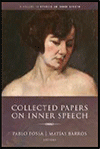
Collected Papers on Inner Speech
Edited by:
Pablo Fossa, Universidad del Desarrollo, Chile
Matías Barros, Universidad del Desarrollo
A volume in the series: Studies on Inner Speech. Editor(s): Pablo Fossa, Universidad del Desarrollo, Chile.
In Press 2024
Inner Speech is an increasingly relevant object of study in psychology research. In recent decades, interest in the study of inner language has even transcended the psychological sciences and has become an interdisciplinary and transdisciplinary study phenomenon. Philosophers, anthropologists, psychologists, educators, and neuroscientists have joined efforts to learn more about this everyday experience inherent in human nature. Specifically, in psychology, the study of Inner Speech has been taken up by cognitive psychologists, cultural psychologists, developmental psychologists, clinical psychologists, and educational psychologists who have ventured into the study of this intimate experience of "talking to ourselves" in silence. This book is a compilation of work on Inner Speech that has been carried out by the research team of the Cognition & Culture Laboratory (C&C Lab) of the Institute of SocioEmotional Well-being (IBEM) of the Faculty of Psychology of the Universidad del Desarrollo, Chile, for more than a decade.
Throughout this book, readers will be able to approach the phenomenon of Inner Speech both at a theoretical-conceptual level and will also be able to learn about some strategies for its empirical exploration. It’s worth mentioning that the works presented in this book constitute only a personal collection of theoretical elaborations and methodological approaches to Inner speech, and not the full spectrum of currently existing research on Inner Speech. The objective of this compilation of articles is to position our line of research and present, in an organized manner, the evolution of our exploration of the phenomenon to the international research program on Inner Speech. More than closing a stage, our mission is to show the progress that we have developed for more than a decade regarding the study of Inner Speech, hoping in this way to open new questions, dialogues and methodological challenges in the international academic community.
CONTENTS
Preface, Pablo Fossa. What Have We Learned About Inner Speech in the Last 10 Years? Pablo Fossa and Matías Barros. PART I: THEORETICAL ELABORATIONS OF INNER SPEECH. The Expressive Dimension of Inner Speech, Pablo Fossa. Private Speech and Imagination: The Liminal Experience Between Myself and Others, Matías Barros, Pablo Fossa, Raffaelle De Luca Picione, and María Elisa Molina. The Relationship Between the Inner Speech and Emotions: Revisiting the Study of Passions in Psychology, Pablo Fossa, Raymond Madrigal Pérez, and Camila Muñoz. From Inner Speech to Mind Wandering: Developing a Comprehensive Model of Inner Mental Activity Trajectories, Pablo Fossa, Nicolás González, and Francesca Cordero Di Montezolo. Is a Wandering Mind an Unhappy Mind? The Affective Qualities of Creativity, Volition, and Resistance, Nicolás González, Camila García-Huidobro, and Pablo Fossa. Reflective and Pre-Reflective Inner Speech, Pablo Fossa and Cristóbal Pacheco. Vygotsky’s Inner Language and Its Relation to the Unconscious System of Freud, Nicolás Suárez and Pablo Fossa. PART II: EMPIRICAL APPLICATION TO INNER SPEECH STUDY. Thought Control, Cognitive Effort, and Physiognomic-Organismic Language: Three Expressive Manifestations of Inner Language at Human Experience, Pablo Fossa, Natalia Awad, Fabián Ramos, Yerko Molina, Sofía De La Puerta, and Carlos Cornejo. The Representational and the Expressive: Two Functions of the Inner Speech, Pablo Fossa. What Can Gestures Tell Us About Vygotsky’s Findings? Pablo Fossa and Nicolás González. Constructing Diversity in Educational Practice: The Role of Inner Speech in Teacher Reflection, Pilar Valenzuela Ramirez and Pablo Fossa. PART III: APPLIED INNER SPEECH AND THOUGHT. Full Silence as an Intimate Experience With Myself: A Cultural Phenomenological Hermeneutic Point of View, Pablo Fossa and Cristóbal Pacheco. Towards a Theoretical Model of Trajectories and Transitions of Thought, Pablo Fossa, María Elisa Molina, Lina Jacob, Jan Gube, and Franziska Sawitzki. Microgenetic Analysis of Thought Trajectories: A Mixed Design, Pablo Fossa, Cristián Cortés, María Elisa Molina, Matías Barros, Camila Muñoz Marcotti, Isidora Sprovera, and Javier Tapia Novoa. “I Know It, but ... I Have the Word on the Tip of My Tongue!” TOT as Phenomenon to Rethinking Metacognition and Feeling-of-Knowing in Psychology, Pablo Fossa, Nicolás González, Camila García-Huidobro, Matías Barros, and María-Isabel Sanhueza. PART IV: FINAL REMARKS. The Double Continuum of Inner Speech: What Can We Expect for the Next 10 Years? Pablo Fossa and Matías Barros. About the Editors.
-
Paperback979-8-88730-628-5
Web price: $45.04 (Reg. 52.99)
-
Hardcover979-8-88730-629-2
Web price: $80.74 (Reg. 94.99)
- eBook979-8-88730-630-8

- PSY050000 - PSYCHOLOGY: Ethnopsychology
- PSY039000 - PSYCHOLOGY: DEVELOPMENTAL: General
- PSY036000 - PSYCHOLOGY: Mental Health
-
 Behavioral Science in the Global Arena
Addressing Timely Issues at the United Nations and Beyond
Behavioral Science in the Global Arena
Addressing Timely Issues at the United Nations and Beyond
-
 Behavioral Science in the Global Arena
Global Mental, Spiritual, and Social Health
Behavioral Science in the Global Arena
Global Mental, Spiritual, and Social Health
-
 Behavioral Science in the Global Arena
Global Health Trends and Issues
Behavioral Science in the Global Arena
Global Health Trends and Issues
-
 Black Women Mothering & Daughtering During a Dual Pandemic
Writing Our Backs
Black Women Mothering & Daughtering During a Dual Pandemic
Writing Our Backs
-
 Children Around the World
The Future of Our Earth
Children Around the World
The Future of Our Earth
-
 Sleep Difficulties and Disorders in Autism Spectrum Disorder
Sleep Difficulties and Disorders in Autism Spectrum Disorder
-
 Stress and Quality of Working Life
Finding Meaning in Grief and Suffering
Stress and Quality of Working Life
Finding Meaning in Grief and Suffering

